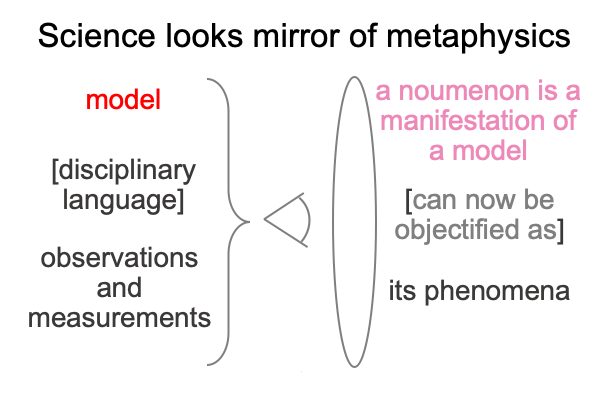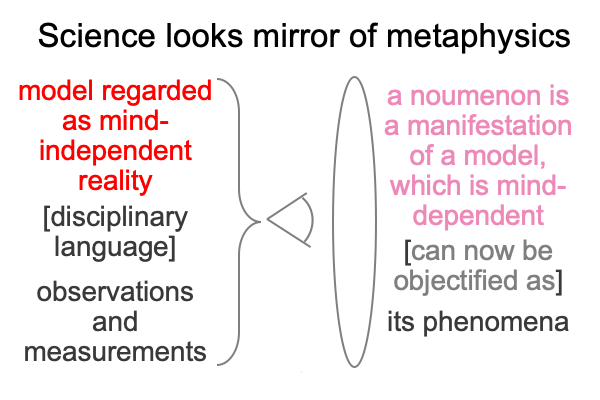0052 What is an illusion?
An illusion is a mind-independent being that is taken to be mind-dependent.
For example, some think that the noumenon of combining hydrogen and oxygen gases (a mind-independent being) is the same as the balanced chemical equation where two hydrogen molecules combine with one oxygen molecule to produce two water molecules (a mind-dependent being.
0053 Often, in science, the noumenon, the thing itself, is regarded as a manifestation of the corresponding scientific mathematical and mechanical model. Tabaczek understands that this is not the case. The triumphalist scientist turns the noumenon into an illusion.

Modern scientists regard the noumenon as irrelevant to their empirio-schematic research, since the thing itself cannot be objectified as its observable and measurable facets. But, if the noumenon is the model itself, then it (the model standing-in for the noumenon) can be objectified as its phenomena.
How convenient.
0054 But, there is a disconnect.
Noumena are precisely what our genus encountered over and over again in the Lebenswelt that we evolved in. Indeed, humans are adapted to recognize and process signs of noumena. We not only identify noumena in the normal context of what is happening?3a, but we objectify noumena in terms of what it means to me?3b. Plus, we contextualize our objectification with another normal context, asking does this make sense?3c. Even more amazing, we wonder whether the noumenon that we have identified2a is really the sign-object of a sign-relation emanating from who knows who or what or where. In short, we act as if the noumenon is both a sign-vehicle (to identify, react to and to evaluate our reaction to), but also a sign-object (that is, what some unknown sign-vehicle stands for).
What does this imply?
If noumena are illusions, as they are in our modern Age of Ideas, then we may have a problem.
0055 What is a delusion?
A delusion is a mind-dependent being that is regarded as mind-independent.
Can the reader see where I am going with this one?

0056 Uh-oh.
What happens when a delusional looks into the mirror?
He sees his own illusions.
0057 I may not be certain about the reason why this wandering friar would choose such an ambitious doctoral thesis project.
However, I am certain that this God-fearing fellow is now a first-person witness of the crazy-town built on the academic turf of the philosophy of science.
0058 The attributes of this modern crazy-town are captured in Razie Mah’s blog, Looking At Alex Jones’s Book (2020) The Great Reset, during the month of January 2023. If a model, regarded as mind-independent reality, is a delusion and if a noumenon, the thing itself, is regarded as mind-dependent reality, then of course, we are headed for a great reset. Or, a great what-if. Philosophers of science struggle to present accounts of the realness of scientific models, despite the fact that millions of people rely on scientific inventions in their daily lives.
Well, the great what-if will change all that.
Once mathematical and mechanical models become more real than reality itself, then the average bloke may start to pay attention.
0059 I ask, “What gives Tabaczek his confidence about the importance of dispositional metaphysics when modern scientific establishments seem to be quite successful, despite the lackluster performances of model-embracing philosophers of science?”
Is it the same confidence that inspires people to get onto airplanes?
0060 Humans evolved to intuitively abstract noumena on the basis of Aristotle’s four causes, long before Aristotle labels them. Tabaczek describes Aristotle’s notion of causality in the first chapter. Tellingly, he couples material and formal causation. He also couples efficient and final causation. Why does he do that? A correlation between Aristotle’s four causes and Peirce’s category-based nested form offers an answer.
